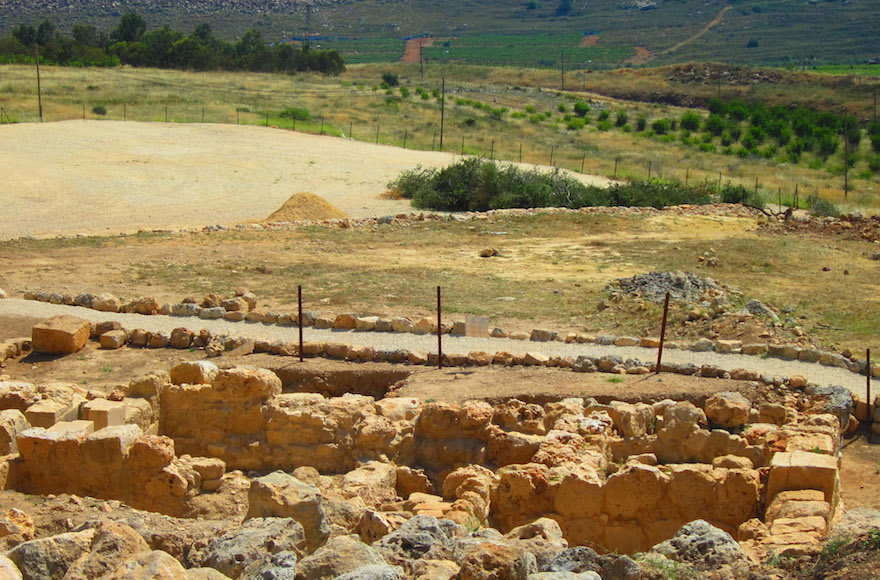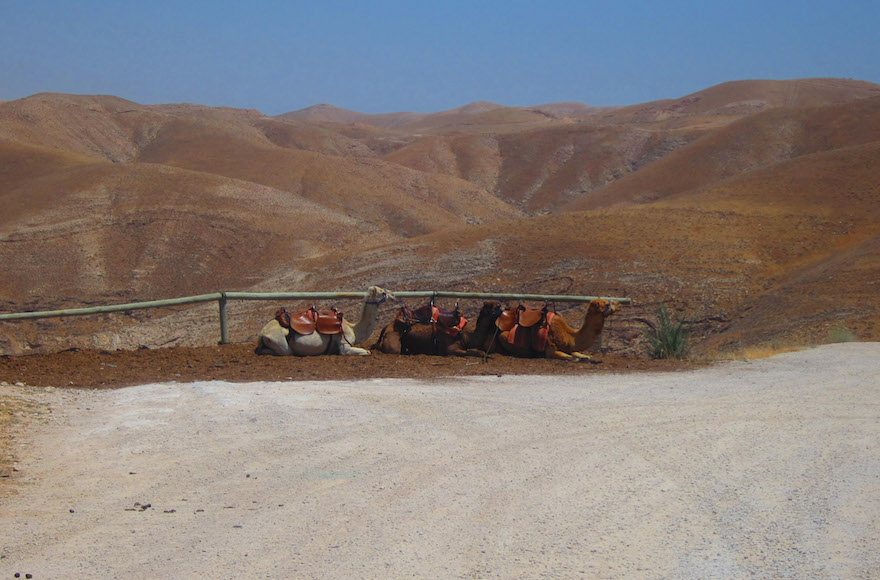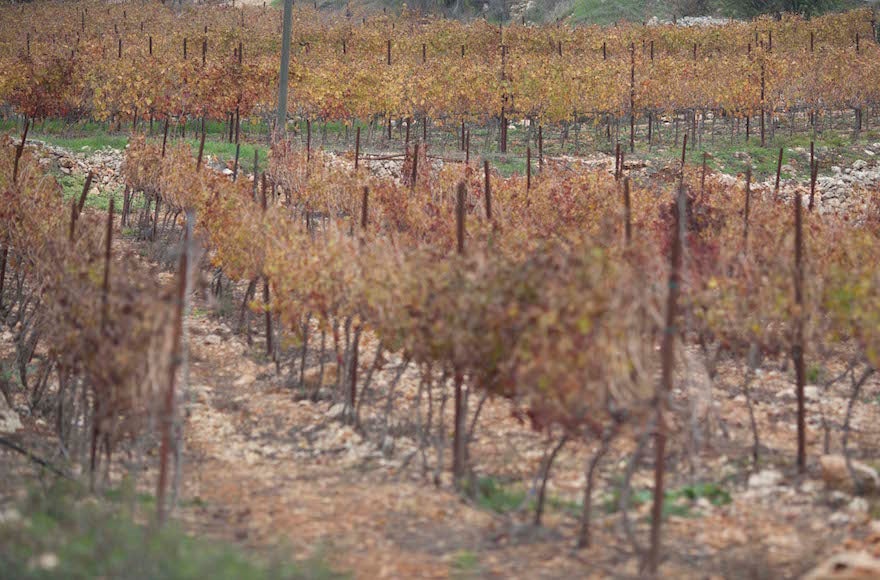ALLON, West Bank (JTA) — Wearing a brown tunic and headscarf, a man who introduces himself as Eliezer invites visitors to sit on low benches covered by carpet in a makeshift Bedouin tent.
Brandishing a map of Canaan, he traces the route his master Abraham walked on his way here from Babylonia. He describes a land dispute between Abraham and his nephew, Lot, over shepherding rights. Then he leads visitors on camelback to a nearby tent for meat, wine and freshly cooked pita.
“When you say that Abraham stood here, it makes an impression on everyone,” said Yair Ben-David, the tour guide playing Eliezer, Abraham’s manservant in Genesis. “The view here hasn’t changed. Everyone talks about it, but this is where it actually happened.”
Ben-David works at Genesis Land, a somewhat hokey tourist attraction deep in the West Bank that aims to provide a taste of what life was like in biblical times. Besides hearing stories of the Jewish patriarchs and riding camels, visitors learn how to make pita, herd sheep and draw water from a well.
“We believe that Israel’s unique tourism is biblical,” said Ben-David, who lives in a nearby settlement. “Tel Aviv is about 100 years old. We have 3,800 years of history here.”
In recent years, settlements in the West Bank have increased their efforts to attract tourists to a territory more likely to conjure images of intractable conflict than a peaceful vacation destination.
Settlers, who call the region by its biblical names, Judea and Samaria, are eager to portray it as the cradle of Jewish civilization.
Left-wing groups, meanwhile, bring visitors to West Bank cities such as Hebron and Bethlehem to understand the ongoing costs of Israel’s control of the territory.
“It’s hard to separate between political and not, if you say it’s the heart of the land,” said Miri Maoz-Ovadia, spokesperson for the Binyamin Regional Council, where Genesis Land is located. “We bring people to show them that we’re pro-settlement in Judea and Samaria. We’ll say it’s important to stay here for its historical implications, and security and water.”
Settlement leaders do not have statistics on overall West Bank tourism, but Binyamin, the region which occupies the central swath of the West Bank, attracted more than 150,000 tourists in 2012 by branding itself “The Land of the Bible.” Guides at key sites such as Shiloh, where the Tabernacle stood before the First Temple was built in Jerusalem, say that about half of foreign tourists are Christians eager to visit religious sites.

An archaeological ruin at Shiloh, a town in the West Bank where the Tabernacle stood before the First Temple was built. Shiloh now attracts Jewish and Christian tourists eager to learn about life in the biblical period. (Ben Sales)
In Samaria, north of Binyamin, a Christian group called HaYovel (Hebrew for “the Jubilee”) brings groups of evangelical volunteers to work at settler vineyards to bolster the settlement enterprise.
“We have to support Israel from a biblical mandate,” said Tommy Waller, the group’s founder, in an interview last year. “What is Israel? These mountains are part of the covenant.”
In addition to its biblical past, Binyamin is home to a wealth of hiking trails; a bike trail will open this summer. The Psagot winery, one of several in the region, doubles as a visitors center. Archeological ruins from the biblical period through the Crusades freckle the area.
For groups on the right, there’s a split over whether and how to discuss the Israeli-Palestinian conflict with visitors. For some, the conflict is a topic that ought to be avoided; the region should be promoted on the same terms as any other — for its vistas, food, and cultural and recreational offerings.
“We don’t hire guides based on their political knowledge,” said Einat Altman, assistant to the CEO of Mishkefet, a private company that offers tours of the settlements. “Our goal is to teach the Israeli public about the themes and sites of Judea and Samaria.”
But for others, tourism is an opportunity to circumvent the media and directly convey the politics underlying the settlement enterprise — especially when politicians or journalists visit the area.
Our mission is to “give our guests an objective picture of the reality here, to evaluate the situation for themselves — and to explain our position,” said David Haivri, a spokesperson for the Samaria Regional Council.
“At every stop, people say, ‘Wow, I wasn’t aware of that. I had a different image of the settlements and the West Bank,’ ” Haivri said. “People are sitting in Manhattan and Washington and talking about moving settlers around, and they haven’t seen it for themselves.”
Not all West Bank visitors are drawn by the area’s recreational opportunities.
Haivri focuses on presenting a positive picture of the Samaria settlements to delegations of diplomats and opinion-makers, showing them organic farms, industrial zones and a medical center. The Samaria Regional Council recently opened its own “Foreign Ministry,” which has hosted 60 members of parliament from across Europe since 2010.
Meanwhile, the Israeli Education Ministry has brought thousands of children to the flashpoint city of Hebron for heritage tours in the past two years. Cabinet ministers regularly bring their staffs to the area. And several liberal groups bring visitors for expressly political reasons, acquainting them with the daily lives of Palestinians and the suffering they endure because of Israel’s continuing military presence.

Camels resting at Genesis Land, a tourist attraction in the West Bank meant to give visitors a taste of life in biblical times. (Ben Sales)
“There’s no place like Hebron that asks the question we’re trying to ask, which is what should our values in society be?” said Yehuda Shaul, co-founder of Breaking the Silence, an Israeli veterans’ group that advocates for an end to the occupation. “It’s so people can see the other side, that it’s not same. You have to understand that this isn’t good for Israel and it’s not good for the Palestinians.”
Breaking the Silence offers Israelis tours of Hebron and the surrounding area. The Israel-Palestine Center for Research and Information, a think tank focused on the Israeli-Palestinian conflict, offers tours of Bethlehem. An American group, Encounter, leads two-day missions for current and future American Jewish leaders to meet Palestinians and learn about their lives.
While he opposes the left-wing organizations’ mission, Haivri agrees that the best way to tour the West Bank is not to sidestep its problems but to confront them.
“Our strategy is not to avoid the reality around us but to work with the reality,” he said. “We had a terror attack last week. We’re not hiding that from our guests.”

Help ensure Jewish news remains accessible to all. Your donation to the Jewish Telegraphic Agency powers the trusted journalism that has connected Jewish communities worldwide for more than 100 years. With your help, JTA can continue to deliver vital news and insights. Donate today.






